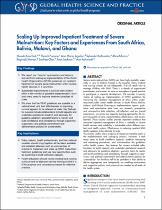| dc.description.abstract | Severe acute malnutrition (SAM) can have high mortality, especially in very ill children treated in the hospital. Many medical
and nursing schools do not adequately, if at all, teach how to
manage children with SAM. There is a dearth of experienced
practitioners and trainers to serve as exemplars of good practice
or participate in capacity development. We consider 4 country
studies of scaling up implementation of WHO guidelines for
improving the inpatient management of SAM within underresourced public sector health services in South Africa, Bolivia,
Malawi, and Ghana. Drawing on implementation reports, qualitative and quantitative data from our research, prospective
and retrospective data collection, self-reflection, and our shared
experiences, we review our capacity-building approaches for improving quality of care, implementation effectiveness, and lessons
learned. These country studies provide important evidence that
improved inpatient management of SAM is scalable in routine
health services and scalability is achievable within different contexts and health systems. Effectiveness in reducing inpatient SAM
deaths appears to be retained at scale.
The country studies show evidence of impact on mortality early in
the implementation and scaling-up process. However, it took
many years to build workforce capacity, establish monitoring
and mentoring procedures, and institutionalize the guidelines
within health systems. Key features for success included collaborations to build capacity and undertake operational research
and advocacy for guideline adoption; specialist teams to mentor
and build confidence and competency through supportive supervision; and political commitment and administrative policies for
sustainability. For frontline staff to be confident in their ability to
deliver appropriate care competently, an enabling environment
and supportive policies and processes are needed at all levels of
the health system. | en_US |

